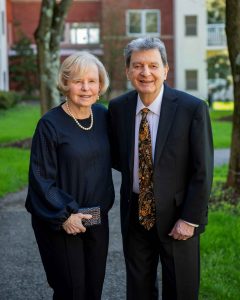“We felt we could do something that would be a benefit to people.”
Paul Ragonese Alumnus and donor
Johns Hopkins UniversityEst. 1876
America’s First Research University
Paul Ragonese has a strong connection to Johns Hopkins: He’s a 1967 graduate of the engineering program at the Johns Hopkins Evening College, and he’s been a patient at the Wilmer Eye Institute since the 1980s. When he and his wife Anne decided to include a gift to Johns Hopkins University and Medicine in their wills, they knew they wanted to support the Whiting School of Engineering and Wilmer, two areas that have had a profound impact on Ragonese’s career and his quality of life respectively.
When reflecting on what inspired him to support Johns Hopkins, Ragonese stresses that he and Anne, who was a nurse at Union Memorial Hospital in Baltimore for 32 years, have been fortunate in many ways and their gift gives them a chance to help others. “We felt we could do something that would be a benefit to people,” he says.

The Ragoneses are now part of a group of more than 1,900 donors who are members of the Johns Hopkins Legacy Society, which celebrates those who contribute an estate or life income gift that supports the future of Johns Hopkins.
“The Whiting School continues to be shaped by the vision, generosity, and trust of others like the Ragoneses,” says Whiting School Dean Ed Schlesinger. “Their gifts towards research and support for the school ensure that our students and faculty can be given the right tools to become leaders in their fields and engineer solutions for unseen futures.”
As a Hopkins student in the 1960s, Ragonese says he was impressed with the exceptional education in his engineering program, which laid the groundwork for a fruitful career to follow. After graduation, he worked as a public health engineer with the Maryland Department of Public Health and as an environmental engineer with a startup company focused on water pollution control. From 1983 to 1998, he was also a mechanical engineer with the U.S. Coast Guard.
Years later, the Ragoneses came back to Hopkins to take a tour of the Whiting School. Paul Ragonese was especially impressed with the research that focused on nanobiotechnology.
At Whiting, faculty, students, and research centers such as the Institute for NanoBioTechnology work to create new technologies at the interface of nanoscience, engineering, and medicine.
Through the development of diagnostic tools and treatments on the atomic or molecular level, Whiting researchers are exploring new cancer therapies, methods of regenerating tissues, and early disease detection. Getting a firsthand look at some of these innovations also motivated the Ragoneses to support the school.
“We felt we could do something that would be a benefit to people.”
Paul Ragonese Alumnus and donor
Ragonese’s connection with the Wilmer Eye Institute has also been longstanding. More than 35 years ago, he came to Wilmer seeking treatment for glaucoma, a leading cause of adult blindness that runs in his family. Decades later, he continues to see a team of ophthalmologists at Wilmer, with Henry Jampel, MD, his longtime provider, coordinating his care.
Glaucoma is a group of eye diseases that cause high pressure in the eyes, which can damage the optic nerve and lead to impaired vision and blindness. As part of his treatment, Ragonese used eye drops and later had an outpatient laser procedure, both of which lowered his eye pressure for some time.
Then Ragonese had a trabeculectomy in each eye about nine years ago. With this procedure, a new passageway is created in the eye for fluid to drain to relieve the eye pressure and prevent further vision loss. Both were successful.
As Ragonese’s provider for three decades, Jampel says his role is akin to a quarterback who keeps track of all the moving parts involved with his patient’s multiple diagnoses. This includes his treatment for a wrinkled retina and cataracts, which is provided by two other ophthalmologists at Wilmer: Adam Scott Wenick, MD, and Esen Karamursel Akpek, MD.
“It would be very difficult for one patient to keep track of all of these details,” says Jampel, Odd Fellows Professor of Ophthalmology at Wilmer and a member of the Glaucoma Center of Excellence since 1988. “So, I look out for his care and make sure that nothing is done in a vacuum. It’s all done with consideration for the whole patient.”
Today, Ragonese meets the criteria for being legally blind, but he says his vision is better than the term would suggest. He continues to visit Wilmer several times a year.
Ragonese says that being able to access many specialties in one place is what first drew him to Wilmer, and why he and Anne have decided to support the institute. “At Wilmer, I feel I’m being attended to by very competent people,” he says. “They are very patient in telling me what the problems are, and they’re willing to discuss them with me. I feel like I am in good hands.”
The gratitude goes both ways.
“The Ragoneses have endowed professorships and research funds, expanded resources for clinical care, and provided opportunities to educate the next generation of leaders in ophthalmic medicine,” says Wilmer Director Peter J. McDonnell, MD. “They also inspire us because these gifts demonstrate the faith our supporters have that investing in the future of Wilmer is worth doing.”
This story first appeared in the Summer 2023 edition of Planning Matters.
Interested in partnering with Hopkins to plan your legacy?
Topics: Alumni, Friends of Johns Hopkins Medicine, Whiting School of Engineering, Wilmer Eye Institute, Fuel Discovery, Promote and Protect Health